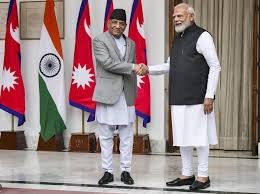In a significant diplomatic move, Nepal’s Prime Minister Pushpa Kamal Dahal, commonly known as Prachanda, embarked on a four-day visit to New Delhi on May 31. This visit holds immense importance as it marks a departure from his previous stance, emphasizing the enduring bond between Nepal and its closest and strongest partner, India. Since assuming power in December 2022, Prachanda has emphasized the government’s commitment to maintaining balanced and trustworthy ties with India without any major shift in approach towards either country.
The decision to make India his maiden foreign destination underlines the historical ties between the two nations and signifies the deep-rooted relationship they share. Despite being widely considered a pro-China figure by many, Prachanda’s visit to India carries a profound message, emphasizing the commitment to mutual respect, cooperation, and sovereign equality between Nepal and India.
The ties between India and Nepal are multifaceted, encompassing religious, cultural, economic, and political dimensions that date back centuries. The open borders and unhindered movement between the people of both countries have fostered relations through marriage and familial bonds. While Nepal holds immense strategic importance in India’s geopolitical and security calculus, India has always approached its relations with Nepal from a broader perspective, guided by principles such as “Vasudhaiva Kutumbakam” (the world is one family) and the policy of “Neighbourhood First.”
India’s involvement in Nepal has primarily focused on boosting Nepal’s development through aid, grants for infrastructure development, and cultural linkages. India has also extended support to Nepal during adversities, such as the devastating earthquake in 2015. Several developmental projects are already underway, including the construction of the Ramayana Circuit that links various sites in both countries. The recent laying of the foundation stone for an Indian monastery by Prime Minister Narendra Modi during his visit further exemplifies the collaborative efforts.
Cooperation in the hydropower sector has emerged as a strong pillar of bilateral ties. Nepal has offered India the opportunity to take up the West Seti hydropower project, and both countries have collaborated on various educational initiatives, including a joint degree program between IIT Madras and Kathmandu University. Efforts are also underway to establish a Dr. Ambedkar Chair for Buddhist Studies through collaboration between the Indian Council of Cultural Relations (ICCR) and Lumbini Buddhist University.
During his visit, Prachanda addressed concerns regarding Nepal’s trade deficit with India and requested non-reciprocal market access for Nepal’s agricultural products, as well as simplified Rules of Origin for other goods. Both leaders discussed the establishment of testing laboratories and mutual recognition of test certificates. Prachanda also urged the lifting of the anti-dumping duty on Nepali jute products, emphasizing the importance of creating a conducive trade environment.
The visit of Foreign Secretary Vinay Kwatra to Nepal before Prachanda’s visit highlights India’s commitment to nurturing and strengthening its relationship with Nepal. The ties between the two nations transcend mere diplomacy and are built on a foundation of mutual respect, sovereign equality, and a shared history with robust cultural linkages. India’s policy of non-reciprocity with Nepal further underscores the deep-rooted civilizational and age-old traditional links between the two countries.
As the journey of collaboration and cooperation continues, India and Nepal stand poised to navigate the future hand in hand. Their bond is not only based on strategic interests but also on the shared values and aspirations of their people-to-people connections. The visit of Prime Minister Prachanda to India serves as a significant step in reinforcing the age-old bonds between the two nations and ushering in a new chapter of strengthened relations.


